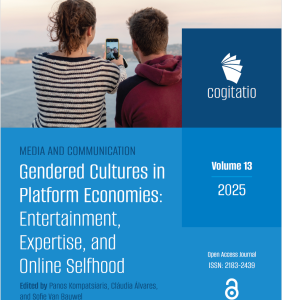Gendered Cultures in Platform Economies: Entertainment, Expertise, and Online Selfhood
Editors: Panos Kompatsiaris – IULM University; Cláudia Álvares – ISCTE-IUL; Sofie Van Bauwel – Ghent University
Various authors
Publisher: Media and Communication, Vol. 13 (2025)
Date: 6 March 2025
This thematic issue examines the gendered dimensions of platform economies, focusing on the construction of gendered online selfhood. Through the affordances of social media platforms, users expand the range of topics and content accessible to the public, simultaneously exposing these subjects to increased visibility and potential debate. Platforms such as TikTok, YouTube, Instagram, Twitch, X, and Telegram enable anyone to create channels and publicize content on virtually any topic, fostering niche communities. In other words, platforms, driven by their pursuit of attention, time, and data, cannot be analyzed solely through a business or organizational lens. The economic dimension is intertwined with cultural formations—beliefs, values, and identity constructions—which carry an anthropological dimension. In this thematic issue, we are particularly interested in the gendered aspects of this intertwining.
Overall, the articles in this thematic issue grapple with the gendered aspects of platform economies through various case studies that span diverse geographical contexts, ranging from China and Korea to Italy and the US, mobilizing diverse methodological and theoretical approaches. These case studies examine the multiple ways in which gendered selfhood is constructed in online spaces. While some findings are more optimistic regarding the potential for empowerment, all cases consistently highlight the pervasive influence of neoliberalism in shaping online identities and the currency of this particular content. They foreground the gendered cultures surrounding these economies, illustrating how the entertainment‐driven nature of online worlds generates new forms of self‐presentation that claim authenticity amidst the constant interchangeabilities of empowerment and alienation, labor and leisure, and normativity and protest.
This thematic issue results from a selection of papers originally presented during a conference held November 20–21, 2023, at Iscte—University Institute of Lisbon, within the remit of the EUMEPLAT H2020 research consortia.
Here you can read the editorial by Panos Kompatsiaris from IULM University, Cláudia Álvares from ISCTE-IUL and Sofie Van Bauwel from Ghent University.


